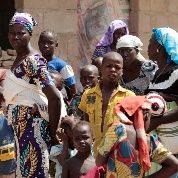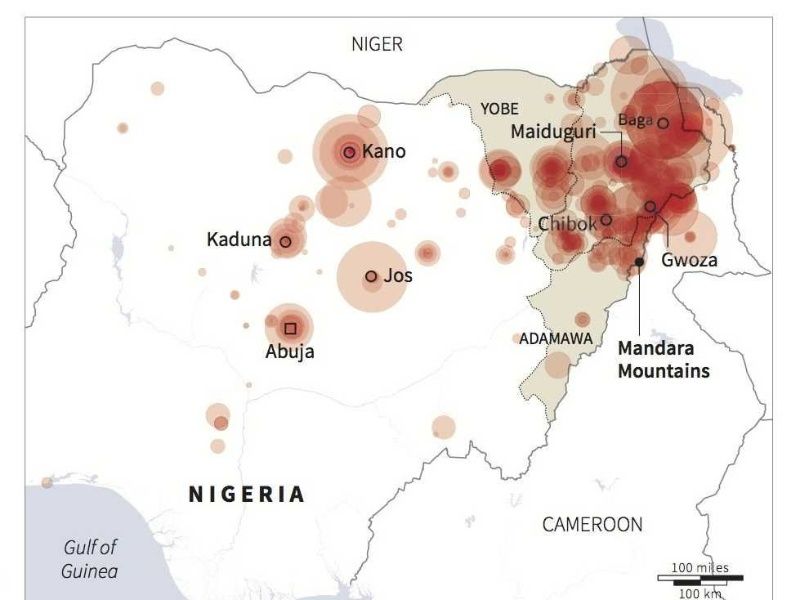Islamist cleric Mohammed Yusuf founded the movement in 2002 in the capital of Borno, Maiduguri, in northeastern Nigeria and called it Jama'atu Ahlis Sunna Lidda'awati Wal-Jihad, or "people committed to the propagation of the Prophet's teachings and jihad." Yusuf had been trained in the Salafist tradition and preached from that strictly conservative interpretation of Islam.

For the first seven years of the group's existence, its aim was not to violently overthrow the Nigerian government. Instead, Yusuf argued that the government in Abuja was corrupt and advocated for a withdrawal from the Western “colonial government” and the creation of a state based on conservative Islamic laws.
The brutal police repression that ensued led to riots against the police violence. To surpress the riots, the police killed over 800 Boko Haram members and arrested Yusuf and killed him while in police custody. The video of the killing of Yusuf was captured on a cellphone and further enraged the remaining members of the Islamist movement.
Related: Report: Nigerian Police, Military Routinely Torture
After the killing of Yusuf, Abubakar Shekau, the second in command, ascended to the head leadership of Boko Haram and vowed to get revenge. Boko Haram began a series of suicide bombings and killings in retaliation to the state-sanctioned murders of its leader and members. They primarily targeted police stations and other law enforcement offices, using hit-and-run guerrilla tactics. In 2010, they staged an infamous prison break, which liberated more than 700 prisoners.
In the past couple of years, Boko Haram has amped up its attacks, especially in northeastern Nigeria. Many Nigerians see the president's response to be tepid at best and have been embarrassed by the reports of Nigerian soldiers running away from the rebels. In November 2014, Nigeria's most senior Islamic cleric released a statement saying, "Soldiers take to their heels and abandon their bases, arms, ammunition and other military hardware on the approach of the insurgents! … Nigerian Security Forces only surface after the deadly attacks and terrorise an already terrorised people by installing road blocks and searching homes."
The Nigerian government's Human Rights Commission in 2013 accused the Nigerian military of arbitrary killings, rape, and torture in its anti-terrorism campaign against Boko Haram.
"Most of the foot soldiers of Boko Haram aren't Muslim fanatics; they're poor kids who were turned against their corrupt country by a charismatic leader."
The Nigerian government in late spring of 2013 declared a state of emergency in the three northeastern states; Borno, Yobe, and Adamawa. Despite this, Boko Haram continued seizing towns and attacking civilians in the region.
In May 2013, Shekau released a video that the group would begin abducting girls in retaliation for Nigerian security forces kidnapping the wives and children of Boko Haram.
After years of increasing violence, Boko Haram gained international notoriety when rebels abducted more than 200 schoolgirls from Chibok, a town 80 miles the south of Maiduguri. Nigerian feminists worked to bring the schoolgirls’ abduction to public attention. The hashtag #BringBackOurGirls went viral.
In a video published in the spring of 2014, Shekau said, "I abducted your girls … There is a market for selling humans. Allah says I should sell. He commands me to sell."
Boko Haram's leadership
Nigeria's military has claimed at least three times to have killed Shekau, and yet videos keep emerging showing him alive and well, commenting on recent events, praising his comrades, and threatening his enemies. Some in Nigeria claim that the original Shekau has been killed, and the men who have appeared in recent videos are look-alikes.
The demands of Boko Haram for the past few years have often focused on the release of Boko Haram prisoners and the creation of an Islamic state in northeastern Nigeria. While Shekau has pledged allegiance to the Islamic State group, his demands have remained focused on the local situation.
Shekau said in video in April 2014, “We know what is happening in this world, it is a Jihad war against Christians and Christianity. It is a war against Western education, democracy and constitution… This is what I know from the Quran. This is a war against Christians and democracy and their constitution, Allah says we should finish them when we get them.”

Reuters Map of Nigeria locating fatalities as a result of Boko Haram attacks between January 2011 and January 2015.
Boko Haram's financing
In 2002, shortly after 9/11, Osama bin Laden sent an associate to Nigeria with a couple of million dollars to give to groups that shared al-Qaida's objectives. One of the “major beneficiaries,” according to the International Crisis Group, was Boko Haram.
EJ Hogendoorn, the International Crisis Group's deputy program director for Africa, told the Daily Beast, “What I can tell you from talking to lots of conservative Muslims in Nigeria is that there was a lot of money coming into northern Nigeria. There are many sources of that money. One of those sources was from al-Qaida.”
Bank robberies and ransom kidnappings are two known ways that Boko Haram has financed itself when it began its campaign in 2009 to conquer north-eastern Nigeria.
According to Peter Pham, a Nigerian academic who works with the Atlantic Council think-tank based in Washington, D.C., Boko Haram has created a “very diversified and resilient model of supporting itself … It can essentially 'live off the land' with very modest additional resources required."
"We’re not talking about a group that is buying sophisticated weapons of the sort that some of the jihadist groups in Syria and other places are using. We’re talking AK-47s, a few rocket-propelled grenades, and bomb-making materials. It is a very low-cost operation," Pham told Reuters.
He added that a lot of Boko Haram's military-grade artillery is stolen from the Nigerian army. They have raided military outposts and taken mortar bombs, rocket-propelled grenades and rounds of ammunition.
One of the group's spokespeople, Abu Qaqa said in January 2012 that “…al-Qaida are our elder brothers… our leader traveled to Saudi Arabia and met al Qaeda there. We enjoy financial and technical support from them. Anything we want from them, we ask.”
Boko Haram is an outgrowth of the government's neglect of northern Nigeria
A report from late 2014 by the BBC and King's College London showed that the movement has made Nigeria the second most deadly nation in the world.
Nigeria is the most populous country on the African continent with over 174 million people. There are almost 350 ethnic groups. In the north of Nigeria, 72 percent live in poverty. While only 27 percent live in poverty in the south.
The Council on Foreign Relations reported that between November 2013 and November 2014, 10,340 violent deaths happened due to the civil war between Boko Haram and Nigerian state security. The conflict has also made 1.5 million people homeless and the group controls 20,000 square miles, an area larger than Switzerland.
Africa Review said that many Boko Haram rebels were people who had been displaced by severe drought and food shortages.
"While a good number of these men were found in major cities like Lagos, pushing water carts and repatriating their earnings to the families they left behind, others were believed to have been lured by the Boko Haram," it reported.
The journal quoted a Nigerian security official who said that there was a correlation between droughts caused by climate change and an increase in militant violence.
“It has become a pattern; we saw it happen in 2006; it happened again in 2008 and in 2010. If you remember, President (Olusegun) Obasanjo had to deploy the military in 2006 to Yobe State, Borno State and Katsina State,” it reported. “These are some of the states bordering Niger Republic and today they are the hotbeds of the Boko Haram."
The Nigerian government provided little to no relief from these food crises. Instead, officials in the Nigerian government seemed more concerned with enriching themselves on the oil that is produced in the south of the nation.
David Francis, who has covered Boko Haram for years, said, "Most of the foot soldiers of Boko Haram aren't Muslim fanatics; they're poor kids who were turned against their corrupt country by a charismatic leader."
"The emergence of Boko Haram signifies the maturation of long-festering extremist impulses that run deep in the social reality of northern Nigeria," writes Nigeria analyst Chris Ngwodo. "But the group itself is an effect and not a cause; it is a symptom of decades of failed government and elite delinquency finally ripening into social chaos."